German Playwright Marianna Salzmann reports on occupied Teatro Valle in Rome
No last days
by Marianna Salzmann
Rome, August 7th 2014. It's July 35th 2014. The occupants should have left on the 31st. They didn't, they changed the calendar instead. "35 luglio" says the poster behind the display window at the door. The city's deadline to clear the theatre by August 1st has been postponed. The negotiations are in progress.
"They will evict us, that's for sure." says Silvia Calderoni and rolls her next cigarette. We are sitting on the floor of Via del Teatro Valle. She is tired out, last night she performed in the south of Italy - she returned directly to Rome. The police could arrive at any moment now despite the official agreement with the representatives of the city to wait until August 10th. Surprisingly early evictions are a common practice everywhere in Europe.
I met Silvia Calderoni in Berlin in Mai of 2014. She came to dj at the German premiere of the Teatro Valle production at Studio Я of the Maxim Gorki Theater. In Italy she's primarily known as a movie star. Many celebrities gather together in and around Valle. Not only now, but since it's occupation started three years ago.
The first time I ever heard of Teatro Valle Occupato and their sensational international success was in Edinburgh during the Fringe Festival 2012. Forget everything that's on here and go see La Merda, I was told. What I saw was probably the best monologue of the last years. About politics in Italy and women's role in a patriarchal society. Plenty of rage and hatred and beauty within a screaming Silvia Gallerano, who got showered with every possible award one can win at European festivals for this performance. She rehearsed La Merda together with author and director Cristian Ceresoli in her flat at that time, which had the size of one room. She spends every day at Valle. If it wasn't for her two children, she would also sleep there. Like the others do.
{denvideo https://www.youtube.com/watch?v=wI76cWVWn50}
More successful than ever – since 1727
The spark leaped over to the Studio Я of the Maxim Gorki Theater after it hosted the production of Teatro Valle – everybody wanted to know who the protagonists are and how to get to work with them. A comparable force and expression hadn't been seen in a long time. What is the trick behind it?
To understand the principle of Valle, one needs to take some of Italy's political incidents of 2011, the year of its occupation, into consideration: The dramatic privatization of cultural and historical institutions (including monuments and museums). Then the reduction of the Ente Teatrale Italiano, the distributional institution of the Ministry of culture, which is responsible for theatre (since Berlusconi's government had declared it unnecessary).
The referendum, which was called to prevent the privatization of the water and urged towards a withdrawal from nuclear power, was just as important. An overwhelming majority voted for the referendum even though the turnout in Italy was as low as ever otherwise. The activists, who during that time occupied the theatre, wrote "Like water, like air – culture." on their banners and moved in. Who they were?
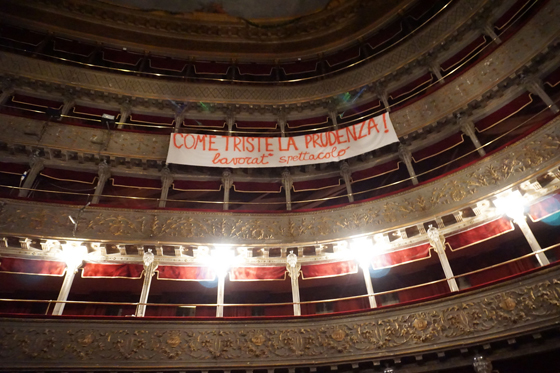 Inside the Valle, a transparent cries out: How sad is prudence! © Marianna Salzmann
Inside the Valle, a transparent cries out: How sad is prudence! © Marianna Salzmann
After the radical reductions in the cultural sector and the cultural landscape lying idle during the Berlusconi era, many Italian artists organized themselves into new collectives which produced art despite the impossible conditions.
One of them was the Company 3.0, which began by reading their manifestos and appeals, which denounced the production conditions and the producing in an elitist art world, to the audience before the theatre evening performances. Shortly after, this collective began occupying cultural institutions for short periods of time, not only to point out the precarious situation of artists, but also to fundamentally warn against the dying of art itself. In
2011 it was stated that one of Rome's oldest and most reputable theaters, the Teatro Valle, had to close. Funds have been cut, it will be privatized. Like many other theaters in Rome. One of the artists who still worked at Valle, joked about occupying it. The others laughed. A month later they walked into the theatre. First they thought it would be for a couple of days, maybe a week if it went well. They stayed for three years.
This year, 2014, the Teatro Valle had the highest number of spectators since it's opening in 1727.
Professional social romantics
Those that act and live in Teatro Valle are not a collective, but a conglomerate of artists who understand activism as a practical part of their work. And they comprise more than the 30 who actually squat the Valle.
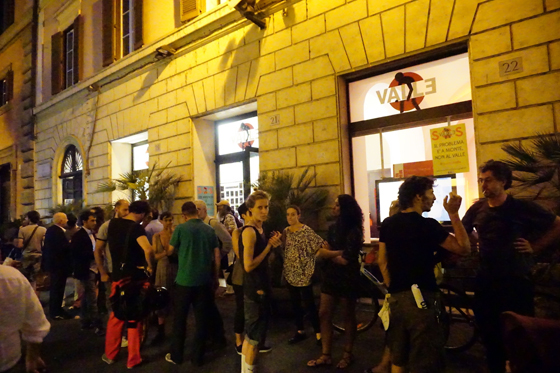 People gathering outside the Teatro Valle © Marianna Salzmann
People gathering outside the Teatro Valle © Marianna Salzmann
The production conditions are different from any other place in Italy. The self organized structure leaves room for new developments and experiments. One could think that their illegal status implies that they do not need to make any contracts with the artists. But while in Italy it has become a sad custom not to pay theatre makers for years and thereby drive them into exile, Valle pays their artists directly.
Where the money for the production comes from? Variably. The ECF prize (European Cultural Foundation) for example helped to make a bigger production possible. Also prizes like Euromed for intercultural dialogue and UBU, Italy's most important theatre award. In addition, a big network keeps the theatre running with supports. The evening's revenue is distributed evenly between maintenance costs and artists fees.
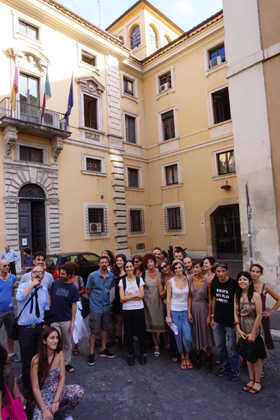 Representatives of the Fondazione Teatro Valle
Representatives of the Fondazione Teatro Valle
Bene Comunque © Marianna SalzmannA foundation has been initiated, Fondazione Teatro Valle Bene Comunque, to lead the theatre out of illegality. 5600 citizens signed the convention. Their representatives sit in the Teatro Valle. No step is decided without an assembly. Alongside famous theatre makers, the foundation consist of jurists and architects, whose responsibility includes proving that the pretences under which the theatre is to be cleared are untenable. The "soluzione finale" of Rome's mayor, Marino, is to have committees declaring the building as in need of renovation and advising the occupants to leave it on behalf of themselves. It needs a Fondazione to negotiate with the city. This one has followed all the steps required for a legal institutional formation. Yet, it doesn't get recognized legally.
"Even if we leave now, the rules of the foundation shall stay. It's about the idea of being able to produce differently. We will stray around, become nomads." says Silvia Gallerano and looks at the crowded entrance in front of the glass door of the Teatro. Many come these days to show their solidarity. Rehearsals for upcoming premieres have been stopped, but there are still some shows running, which are always overcrowded. Not tonight though, today was the discussion meeting with the members of the foundation to discuss the next steps for coming talks with the representatives of the city. And after that, the children performed a play for their exhausted parents in which they showed what to do, when the police comes. Standing ovations for 5-10 year olds.
Anger but no panic
The comunardi have surprised everyone by seeking dialogue with the representatives instead of barricading themselves in. Meanwhile, the italian press claims that they are taking something that belongs to the state, thus supported by public tax money. They are accused of holding on to a public place. However, while standing in the foyer of the Teatro Valle it it is hard to feel that sense of dogged possession. No one is armed to the teeth and spits
fire. There is sadness in their faces, but not panic. Anger, but not desperation. A knowledge of the ending of something, but already new plans for the future. No time is wasted on tearing out ones hair, which would only make resistance impossible. Instead, they network, they discuss, they demand more and to go further. And they demand this despite the dark circumstances that we have all been presented with.
A movement can not be evicted is written all over Berlin-Kreuzberg. The comunardi in Rome also carry this knowledge. Throughout the city, all of Italy, everywhere in Europe, self organized projects are being evicted. This means we need to continue, because there is still time for self-empowerment. The knowledge and motivation which rises from it can never be taken away from these people, or any of us. What will become of their theatre in the next days and where the people involved in it will go, remains to be seen.
Production conditions condition the product. Valle was about to create its own aesthetics. The next season was going to be a year of big productions. Shows like Il Macello Di Giobbe by Fausto Paravidino are now on hold. It was going to be a complex play for the big stage which emanated from Crisis, a project to promote contemporary drama. Same with Rabbia (anger), an interdisciplinary platform for new voices to unload themselves in film, visual arts, music, comics and theatre. What was and is fostered, is the capacity to make ones own voice heard and to speak about the present.
Valle has been a place in which one could take one's time to develop; and this in a place with no money. By contrast, in big theaters with disposable money, resources usually get lost within institutional machinery leaving artists nothing but crumbs.
This feels very familiar to someone who works in Germany.
The time is stopped but it doesn't stand still.
It's July 36th. 1716 years ago today, a miracle happened in Rome: it snowed in the middle of summer. White petals rain down the Basilica Di Santa Maria Maggiore to remember this event.
The conversation with the Teatro di Roma took place today. A theatre that has proposed to take over the productions of the Teatro Valle. Not the idea and the methods of production, but the artists and their shows. To pick the marketable and drop the rest, one could also say. It is not clear whether this is the only chance to rescue the art before it all gets razed to the ground.
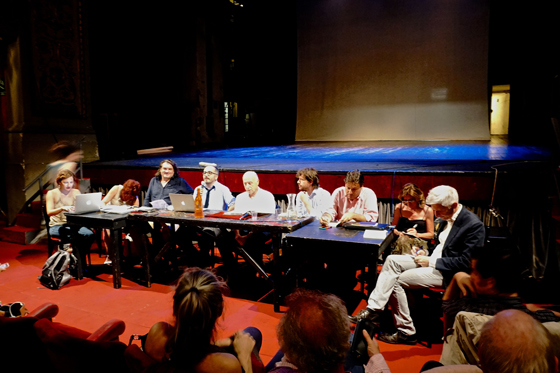 Convention after a talk with Teatro di Roma © Marianna Salzmann
Convention after a talk with Teatro di Roma © Marianna Salzmann
The atmosphere before the delegation of the Fondazione Teatro Valle Bene Comunque commences with negotiations is tense. Nobody knows who is really pulling the strings, who has power or what the crucial conversation will be. Is Teatro di Roma really helpful or will it just mark the end of an era? Will it really be over on August 10th? What will happen to the building, will it really be renovated? To restore the old splendor of such a place could take decades and no one has the money for that. Very likely it will just be closed.
"Everybody speaks of participatory theatre but no one knows for sure what that really means." says Silvia Gallerano and shrugs her shoulders. "As soon as anybody participates, they become undesirable." While the delegation negotiates in the Ministry of culture, Galleano gets the updates via mobile phone: Teatro di Roma agrees to support the Teatro Valle so it can remain a public place for the next 100 years. No privatization. Brief cheering in the cafe. And now what? The next meeting will take place in two days, this time with the assessor of culture in person.
One of the demands for example is to make the Valle accessible not only during the evenings but also during the days, giving people the possibility to enter it and partake in everything. No production without participation. Maybe it is not about the abolition of hierarchical structures but about their reduction to the necessary minimum. How to explain that to a representative of the Government?
To restore the public and not the building
"The theatre has been public ownership since the 18th century. Legally the theatre belongs to the italians and the city administrates the property. Now, 66 years after the constitution was adopted, it actually gets taken on its word." says Paolo Maddalena during the evenings assembly. Maddalena is a jurist, he was judge at the Constitutional Court and its vice-president. He keeps mentioning legal clauses yet manages to sound optimistic.
The hall is half filled, everybody is exhausted and the discussion continues until midnight. The former minister of culture, Massimo Bray, is present and encourages the activists in their desire to maintain the occupation. He says it makes no sense to close an ongoing, functioning theatre. A technician picks up the microphone shortly after him and explains that Teatro Valle didn't have the required security certificates before its occupation and ran nevertheless. To argue it is dangerous to stay in the building is a trick. Cristian Raimo, a famous writer, invites everyone who hasn't done it yet to take a look around the building and ensure themselves of the good condition it is in. It is the public that needs to be restored and not the building exclaims Tomaso Montanari, an art historian and guarantor of the Fondazione. Applause.
 Children rehearsing the case of emergency © Marianna Salzmann
Children rehearsing the case of emergency © Marianna Salzmann
Almost everyone agrees, as it usually goes with a plenum. And thus everyone makes preparations to move out of the Teatro Valle on August 10th all circumstances notwithstanding. That is unless representatives of the city capitulate, and accept the theatre's demands to manage itself. And then white petals will snow down on us, and August will break.
If you accept the invitation to observe the historical vestibules of the theatre, you traverse the time-worn planks of the stage to the gangplanks, passing the dressing rooms and the storage compartments that now house the stars of the show. Some 22 meters above the stage you find the erstwhile balustrades rendered of single bolts of old growth. Going through a small door you find yourself on a small terrace overlooking the roofs of Rome. Silvia Calderoni smiles; "Nobody here can actually afford a terrace. Even one this small. Just yonder is the parlament. We're in the middle of it all." She has a spark in her eyes. "We wanted to rent the adjacent building. It was empty for a long time. They didn't give it to us. Now it will become a hotel."
This is a movement, not an occupation
An understanding of alternative conditions of theatric production lies at the heart of the enormous success of the phenomenon that is the Valle; and this understanding is something that those involved with the Valle want to share with the entire world. But they are not interested in being missionary about their process, preferring an exchange with international partners.
"We are a movement, we don't have any answers, but a load of questions. With these questions we intend to strike out into the world;" Says Silvia Gallerno; "We are engaging in the hopes of an ethical collectivity in the artworld"
They are searching for new cities, new partners for cooperation. They are engaging in dialog with those partners that already exist, in order to maintain the Teatro Valle as a first rate artistic model. And thus a change is happening. Out of a building, a principle is taking shape. There is no reason to be worried about he artistic success of their theatrical productions. The list of theaters in which Teatro Valle has played sold out show is too long to count, from New York to Zagreb, by way of London; Copenhagen to Berlin. When we were preparing the
handbills for the Maxim Gorki Theater in Berlin for La Merda, I didn't know which of their overwhelming five star reviews I should choose. There were just too many.
We can only hope that many theaters across Europe seek out contact to this breathtaking theatrical endeavor, so that they can strive to make theatre that is missing all over Europe at the present moment.
Translation: Alicia Agustín
Marianna Salzmann, house author of the Maxim Gorki Theater Berlin and artistic director of the Studio Я, visits the Teatro Valle Occupato in July 2014 for three weeks.
Read the Italian translation of Marianna Salzmann's report here.
Read the German Original of Marianna Salzmann's report here.
All English texts on nachtkritik.de are listed here.
Für Horizonterweiterung
Der Blick über den eigenen Tellerrand hinaus ist uns wichtig. Wir möchten auch in Zukunft über relevante Entwicklungen und Ereignisse in anderen Ländern schreiben. Unterstützen Sie unsere internationale Theaterberichterstattung.
meldungen >
- 26. April 2024 Toshiki Okada übernimmt Leitungspositionen in Tokio
- 26. April 2024 Pro Quote Hamburg kritisiert Thalia Theater Hamburg
- 25. April 2024 Staatsoperette Dresden: Matthias Reichwald wird Leitender Regisseur
- 24. April 2024 Deutscher Tanzpreis 2024 für Sasha Waltz
- 24. April 2024 O.E.-Hasse-Preis 2024 an Antonia Siems
- 23. April 2024 Darmstadt: Neuer Leiter für Schauspielsparte
- 22. April 2024 Weimar: Intendanz-Trio leitet ab 2025 das Nationaltheater
- 22. April 2024 Jens Harzer wechselt 2025 nach Berlin



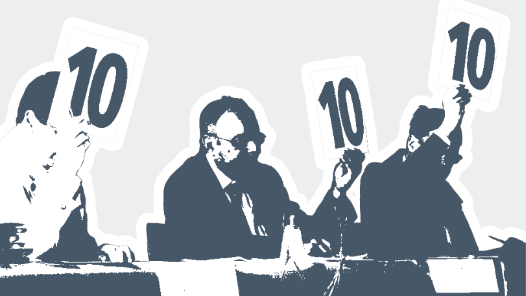
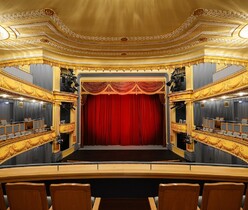



neueste kommentare >